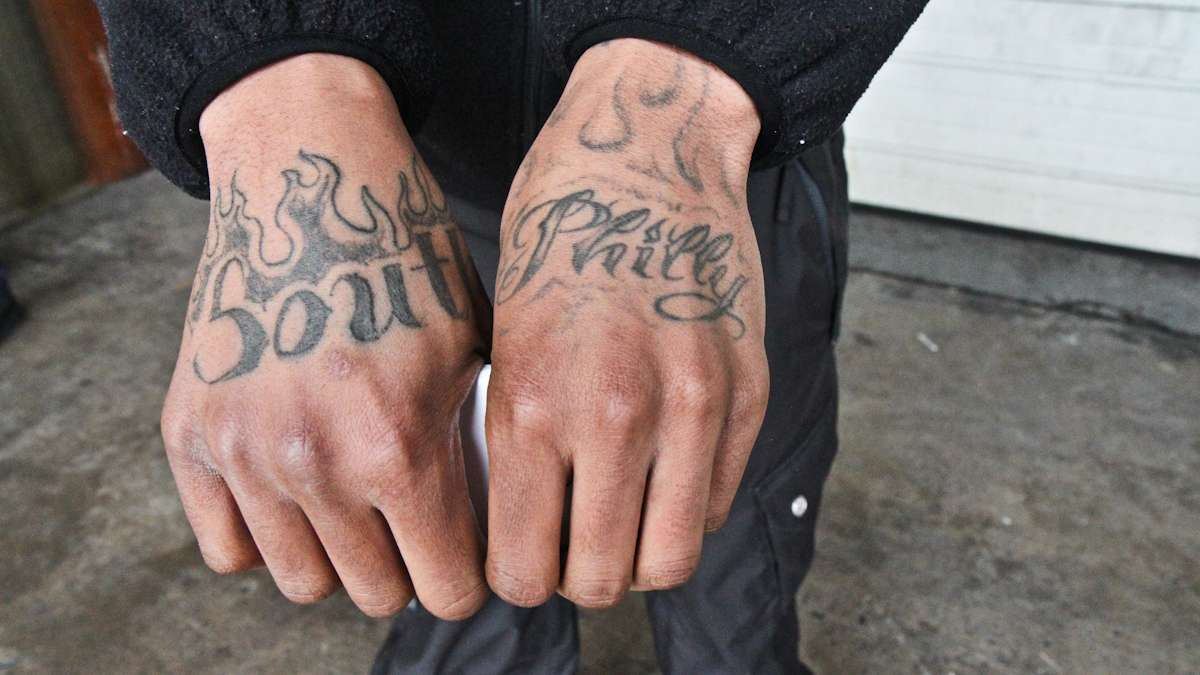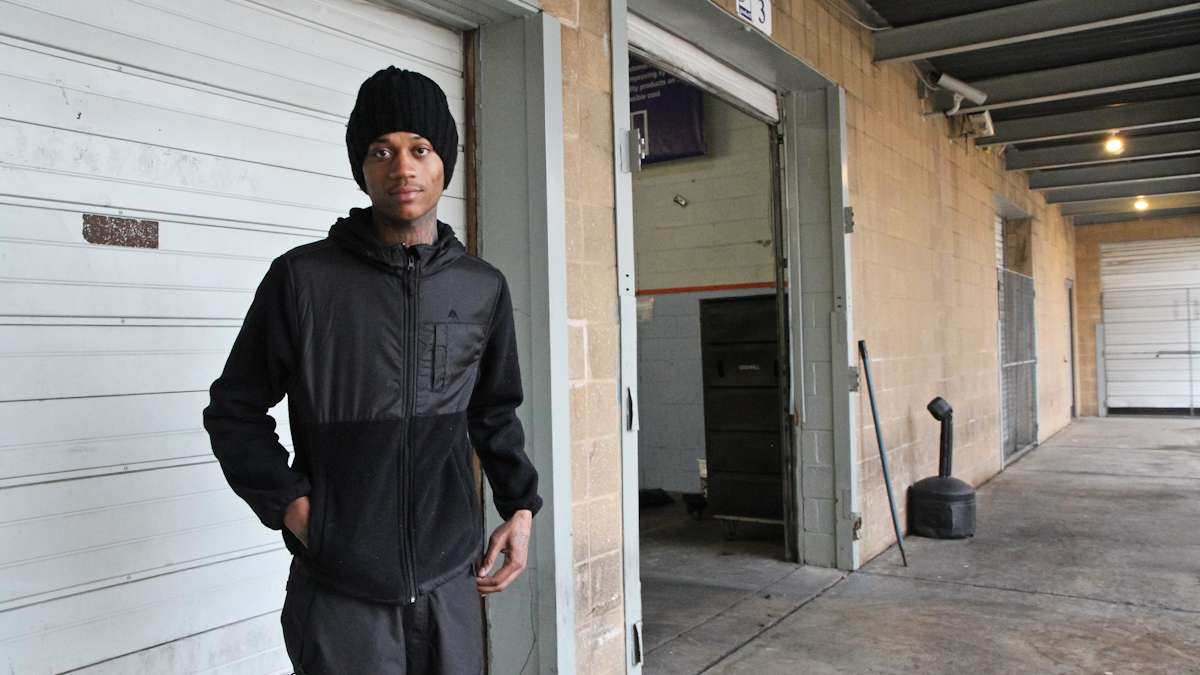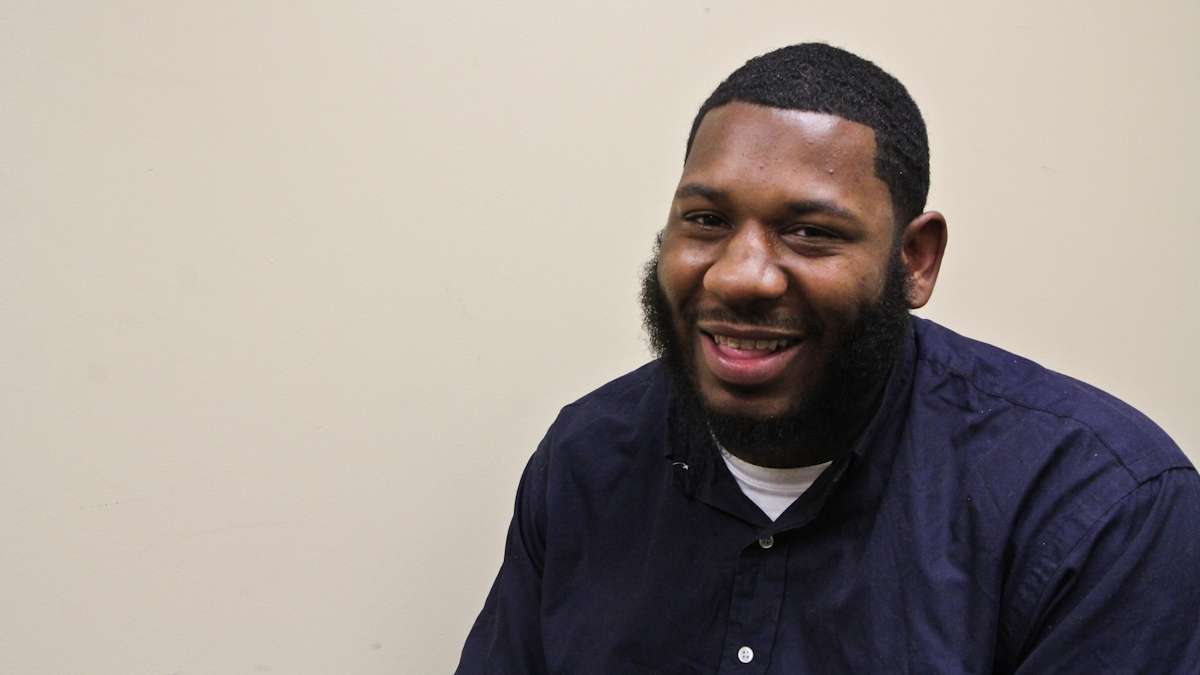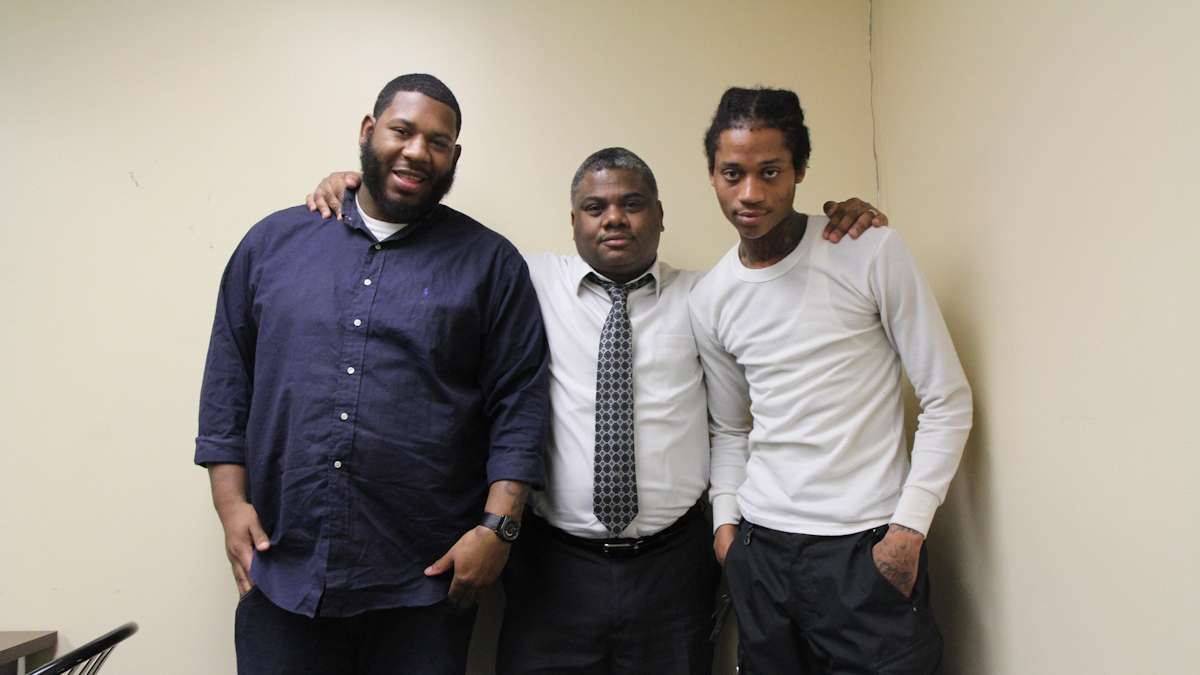Trading in gangs and guns to leave street violence behind
Listen 4:55-

Jarren Taylor used to run with a group that covered a few blocks in South Philadelphia before he went to prison for gun possession. (Kimberly Paynter/WHYY)
-

Jarren Taylor says these days he's trying to stay out of trouble. He says he likes his job at the Goodwill facility near 7th and Spring Garden streets. (Kimberly Paynter/WHYY)
-

Mikal Bradley wasn't sure he could get a decent job with a criminal record. When he called his mom to tell her he had a job, he says she cried on the phone. (Kimberly Paynter/WHYY)
-

Ruben Jones has helped Mikal Bradley (left) and Jarren Taylor (right) get their lives back on track. (Kimberly Paynter/WHYY)
Building a new life can be difficult. Some men who are leaving the gang life behind in South Philly, are struggling everyday to do just that. In their quest to get a job and an education they’re getting a push and some help from a nearly one year-old crime-prevention strategy that’s seen success in other parts of the country.
Jarren Taylor’s voice comes out just above a whisper.
“After I got shot in my neck I seen the flash and then I didn’t feel anything,” Taylor said, “I just looked down and seen blood.”
While Taylor was hanging out with friends in South Philly, a dispute erupted between neighborhood rivals. He was shot once in his leg and once in his neck. The second bullet left a scar in the middle of his neck, just below his Adam’s apple.
He’s a slim guy with hair pulled into short, tight braids and a lot of gang tattoos. He says these days he’s trying to stay out of trouble.
“I don’t even play with guns no more, ’cause I’m not trying to go to jail,” Taylor said. “Like in my city, we — where I’m from — we go to war with people. People die and stuff everyday, but like, you can isolate yourself, and you can like get a job and just do better,” Taylor said.
Philly police usually don’t call these groups gangs. They’re not big like the Bloods or the Crips. Taylor belonged to one that covered only a few blocks in South Philadelphia.
“I’m not in a gang. Where I’m from, we don’t rep gangs, we just rep blocks,” Taylor said. “Like the street we come from. I’m from 19 Street. 19th and Titan.”
Taylor still lives there. He says he is trying to stay away from the dangerous world that lead him to prison for gun possession. The 22-year-old says he came home from prison determined not to go back, but unsure of how to move his life forward.
He’s gotten some help from a crime-prevention strategy called Focused Deterrence.
The strategy’s been in place in Philadelphia about a year, but it’s been around law enforcement circles for decades. Well-known criminologist David Kennedy helped develop the strategy in the 1990s, when it was called Operation Ceasefire or The Boston Gun Project. In that city the startegy’s implementation coincided with a plummet in youth homicide numbers: there was a 63 percent drop after the strategy was put in place.
Advocates say Focused Deterrence is different from other efforts to fight crime. They say it’s not “just another program” that will disapppear after a while. Instead, Focused Deterrence supporters say it’s a new way of doing business.
In Philadelphia, the city police, the district attorney’s office, the ATF, FBI and U.S. attorney’s office have banded together to form a united front. At “call-ins” with members of the city’s gangs or groups, law enforcement officials let the guys know that know if a member of their gang fires a gun, everyone in the group will feel the heat of police and prosecutors breathing down their necks.
In Philly there is hope the strategy will clamp down on the violence that’s long-plagued some pockets of the city. The strategy saw such success up north that some started calling it the “Boston Miracle.”
A new start
Getting a job wasn’t quite a miracle for Jarren Taylor, but it certainly was unexpected.
It’s not a fancy gig, but Taylor says he likes working at the Goodwill facility near 7th and Spring Garden streets, processing donated goods and cleaning TV remotes through a contract Goodwill has with Comcast. Sitting in the large warehouse space surrounded by other workers doing similar jobs, Taylor feels lucky to be here.
“Right now I’m just cleaning remotes and stuff. Making sure they’re perfect and with no scratches and all that. I like my job,” he said. “Everything I do at my job I like.”
Taylor has benefited from the social-services half of Focused Deterrence. Police are the stick, pressuring gang members not to shoot each other by promising to go after them for the least little infraction.
Ruben Jones is essentially the carrot. He offers help to Taylor and others trying to get their lives back on track. He says Taylor is very resilient.
“Jarren is what we hope for in this strategy,” Jones said. “He’s a young person who came in — you know, took advantage of the opportunities presented.”
Jones grew up in North Philadelphia and is an integral piece of Focused Deterrence. His help landing a job or getting a GED can be particularly useful for guys like Taylor who have a criminal record, no high school diploma, and little work experience.
He knows their struggles firsthand: Jones served 15 years in prison for robbery and aggravated assault.
Taylor says without Jones’ guidance he would still be looking for a job.
“I would have been in the streets — more because I wouldn’t have had opportunities like that, so I probably would have been doing things I’m not supposed to be doing, like selling drugs or playing with guns,” Taylor said.
He says if Focused Deterrence can help him, the strategy can help other guys too. Taylor says he’s passed on the information to other guys he knows who could use it. Like Taylor, they could work toward their GED or get a job.
Taylor’s not alone here. Goodwill employs just over a dozen men from the program. They learn the importance of showing up on time, following instructions, and other employment basics.
Mikal Bradley says he wasn’t even sure he could get a decent job since he has a criminal record.
“My mom, when I called her and told her that I had a job, she cried on the phone,” the 22-year-old said.
Bradley and Jarren Taylor both excelled so much in their jobs that Goodwill offered them full-time, permanent positions. Both are also working to earn their GEDs.
Bradley says his mom and dad are proud of him and want him to succeed.
“She wake me up every morning — 5 o’clock in the morning, waking me up. I’m like, ‘Mom I don’t got to be to work till 8 o’clock.’ She said, ‘I don’t care if it’s 5 o’clock. Get washed up and dressed now. You gonna leave out of here at 7.'”
Bradley’s moved a few determined steps away from the life he’s trying desperately to escape. He says it is his two young daughters who inspire him to stay out of trouble.
“I didn’t even think I would make it to see 22. I’m about to be 23 in a couple of months,” he said. “I’m getting older now, so hanging out on the streets and the corners — that’s not there no more — like selling drugs is not for me.”
Ruben Jones says Focused Deterrence came along at the right time.
“A lot of these guys were crying out for help,” said Jones. “They don’t want to be ducking bullets, or running from the police or hurting people. They just don’t have a lot of skill sets that can lead to opportunity. They just need someone to believe in them and give them a chance so they can have a start toward a new life.”
It’s early, but there are already positive signs in South Philadelphia.
Next week Philadelphia City Council will hold hearings on the Focused Deterrence strategy and whether to expand it to other parts of the city.
WHYY is your source for fact-based, in-depth journalism and information. As a nonprofit organization, we rely on financial support from readers like you. Please give today.




